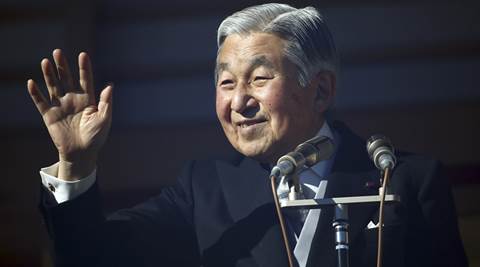Opinion Japan Emperor Akihito: Let him go
Japan’s Emperor Akihito should be allowed a dignified exit
 In this Dec. 23, 2014 file photo, Japan's Emperor Akihito waves to well-wishers as he and family members appear on the balcony of the Imperial Palace during the emperor's 81th birthday in Tokyo. Japanese will tune in to Emperor Akihito’s rare video message Monday, Aug. 8, 2016 following reports that he would abdicate in the next few years, which initially came as shock but which many people appeared to have welcomed as a deserved rest for the 82-year-old beloved monarch. (AP Photo/Eugene Hoshiko, File)
In this Dec. 23, 2014 file photo, Japan's Emperor Akihito waves to well-wishers as he and family members appear on the balcony of the Imperial Palace during the emperor's 81th birthday in Tokyo. Japanese will tune in to Emperor Akihito’s rare video message Monday, Aug. 8, 2016 following reports that he would abdicate in the next few years, which initially came as shock but which many people appeared to have welcomed as a deserved rest for the 82-year-old beloved monarch. (AP Photo/Eugene Hoshiko, File) Emperor Akihito, the ceremonial head of state in Japan, wants to retire. At 82, and after a series of ailments — he has had heart surgery and treatment for prostate cancer — he has publicly stated that he is no longer able to perform his duties. In 2015, during an event to commemorate the end of the Second World War, Akihito began reading a statement when he was supposed to observe a moment of silence. Over the last few years, he has cited many such instances to make a case for abdication. A recent survey showed that over 90 per cent of Japanese people supported their emperor’s wish for a dignified exit. As things stand now, though, Akihito cannot explicitly abdicate the throne, and such a move would involve a change in the country’s constitution. Historically, the monarchy has played an integral role in Japan’s national imagination. The Second World War was fought in the emperor’s name and he was imbued with divinity. It was only after Japan’s defeat that the monarchy transitioned to a constitutional, rather than divine, role.
Given the state of other hereditary rulers around the world, Akihito presents an interesting contrast. Queen Elizabeth II, the longest reigning monarch of Britain, shows no sign of slowing down at 90. Her son Charles, no spring chicken himself, has been waiting in the wings for decades. The wave of nationalism in the wake of Brexit will likely increase the royals’ popularity. In Thailand, there are heavy curbs on free speech when it comes to the king — any perceived insult against the royal family can land you in jail. In many cases, the vagaries and deficiencies of political democracy have strengthened dictatorial tendencies in hereditary rulers. In neighbouring Nepal, it took a considerable amount of time and widespread protests against King Gyanendra to bring back democracy.
Emperor Akihito is reportedly a man who takes his constitutional role seriously. He is looking for a dignified end to his career and the chance to groom a successor before age and infirmity rob him of the chance. The law of the land should allow him that courtesy.





